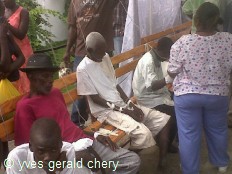|
||||||||||||||||||
|
|
Haiti - Epidemic : Provisional assessment and possible spread 23/10/2010 13:01:15
"With good case management, we can prevent people from dying, perhaps only <1% of cases. However, in areas where there is no good way of ensuring patients remain adequately hydrated, death rate or case fatality ratio may rise substantially, closer to 50%" said Dr. Jon Andrus, Deputy Director of the Pan American Health Organization (PAHO), a branch of the World Health Organization (WHO) in Haiti. The first case of cholera, according to the Haitian Ministry of Public Health and Population (MSPP), was recorded on October 20 in Bas-Artibonite. An area where much of the population, particularly along the Artibonite River, living in precarious conditions, especially without drinking water or latrines, as outlined in the Health Department of Artibonite (Direction Sanitaire de l’Artibonite DSA). Since October 20, health officials in the department noted a rapid increase in cases and deaths in communities of Marchand Dessalines, Petite Rivière de l'Artibonite, Grande Saline and Saint-Marc. And following the treatment by the National laboratory of Health of the taken samples, the managing director of the Ministry for the Public health, Dr. Gabriel Thimoté, announced, in the evening of October 21st, in Saint Marc (Bas-Artibonite), that the identified epidemic was the cholera. Recall that the confirmation of cholera O1 strain comes from the Haitian laboratories and WHO said today not to confirm the presence of cholera in awaiting the results of its own tests WHO always evokes for the moment an "outbreak of diarrhea" and insists that other diarrheal diseases as cholera can also kill in hours if not treated. Haitian authorities and humanitarian organizations were Friday in high alert to try to stem the epidemic. Alex Larsen, the Haitian Ministry of Health has also called the candidates making campaign within the framework of the presidential and legislative elections, not to organize during a certain time meetings and public gatherings in the areas affected by the epidemic. Moreover, it invites all the citizens to go in an health center as of the appearance of the primary symptoms recalling that there are stocks of drugs and serums available in the affected regions. Officials are concerned about the possibility that the disease affects the tent camps of the capital inhabited by hundreds of thousands of earthquake victims. Humanitarian agencies have expressed fears that the disease can spread rapidly through the IDP camps inhabited by hundreds of thousands of disaster due to poor hygiene and lack of access to drinking water. International agencies have mobilized all medical personnel available to try to contain the spread of the disease and treat patients. The epidemic of cholera in northern Haiti since the last few days is likely to extend before being controlled, said Friday a senior official of the OPS. The first two cases of cholera out of the Artibonite were confirmed at Arcahaie, a city near the capital. Experts also investigating possible cases in Croix-des-Bouquets, a suburb Capital. Local radio reported that at least two dozen cases of diarrhea have been reported on the island of Gonave. Due to the weakness of health facilities, health centers in the department hit by the epidemic are overwhelmed. "We need to create a quarantine to treat cholera, strengthening epidemiological surveillance and better organize care," said Dr. Gabriel Thimoté. The state of emergency was declared in the Artibonite and the rest of the country has been put on alert. The Haitian government on Friday asked the United Nations Stabilization Mission in Haiti (MINUSTAH) to coordinate the distribution of drugs coming into the country. They must treat those infected by a severe cholera epidemic. The OPS currently has drugs and supplies in stock at the warehouse PROMESS near the airport in Port-au-Prince including 750,000 packets of oral rehydration salts sufficient to treat 100.000 mild cases of diarrhea and enough serum intravenously to treat 4.000 severe cases. PROMESS also 300.000 doses of antibiotics. Haiti will need an additional supply if the cases are increasing. "We also asked the World Health Organization (WHO) to receive and store the medicines that are given by international bodies," said Dr. Gabriel Thimoté Director General of the Ministry of Health. See also: https://www.haitilibre.com/en/news-1486-haiti-health-the-fight-against-the-epidemic-is-organized.html https://www.haitilibre.com/en/news-1484-haiti-health-alex-larsen-confirmed-a-cholera-strain-o1.html https://www.haitilibre.com/en/news-1480-haiti-health-who-does-not-confirm-that-it-is-cholera.html https://www.haitilibre.com/en/news-1479-haiti-alert-outbreak-the-death-toll-mounts-135-deads-1498-infected.html https://www.haitilibre.com/en/news-1477-haiti-alert-lethal-and-devastating-outbreak-out-of-control.html https://www.haitilibre.com/en/news-1472-haiti-health-alert-at-least-50-dead-cholera-epidemic.html HL/ HaitiLibre
|
|
|
Why HaitiLibre ? |
Contact us |
Français
Copyright © 2010 - 2024 Haitilibre.com |



